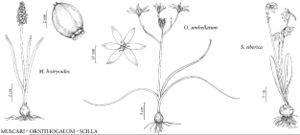Difference between revisions of "Muscari botryoides"
Gard. Dict. ed. 8, Muscari no. 1. 1768.
FNA>Volume Importer |
FNA>Volume Importer |
||
| Line 27: | Line 27: | ||
|elevation=0–1500 m | |elevation=0–1500 m | ||
|distribution=B.C.;Nfld. and Labr. (Nfld.);N.S.;Ont.;Ala.;Ark.;Calif.;Conn.;Del.;D.C.;Ill.;Ind.;Kans.;Ky.;Md.;Mass.;Mich.;Minn.;Miss.;Mo.;N.H.;N.J.;N.Y.;Ohio;Okla.;Oreg.;Pa.;Tenn.;Tex.;Utah;Vt.;Va.;Wash.;W.Va.;c;se Europe;expected elsewhere. | |distribution=B.C.;Nfld. and Labr. (Nfld.);N.S.;Ont.;Ala.;Ark.;Calif.;Conn.;Del.;D.C.;Ill.;Ind.;Kans.;Ky.;Md.;Mass.;Mich.;Minn.;Miss.;Mo.;N.H.;N.J.;N.Y.;Ohio;Okla.;Oreg.;Pa.;Tenn.;Tex.;Utah;Vt.;Va.;Wash.;W.Va.;c;se Europe;expected elsewhere. | ||
| − | |discussion=<p>Muscari botryoides is the commonest and most cold-hardy of the Muscari species in the flora.</p> | + | |discussion=<p><i>Muscari botryoides</i> is the commonest and most cold-hardy of the <i>Muscari</i> species in the flora.</p> |
|tables= | |tables= | ||
|references= | |references= | ||
| Line 52: | Line 52: | ||
|publication year=1768 | |publication year=1768 | ||
|special status= | |special status= | ||
| − | |source xml=https://jpend@bitbucket.org/aafc-mbb/fna-data-curation.git/src/ | + | |source xml=https://jpend@bitbucket.org/aafc-mbb/fna-data-curation.git/src/8f726806613d60c220dc4493de13607dd3150896/coarse_grained_fna_xml/V26/V26_634.xml |
|genus=Muscari | |genus=Muscari | ||
|species=Muscari botryoides | |species=Muscari botryoides | ||
Revision as of 17:46, 18 September 2019
Plants to 20(–30) cm. Bulbs ovoid, 1.5–2.5 × 1–2 cm, offsets absent, tunics translucent to pale brown. Leaves 2–4(–5); blade prominently ribbed, linear-spatulate, 15–35(–40) cm × 3–8(–12) mm, apex abruptly contracted. Scape 20–35(–40) cm, usually slightly exceeding leaves. Racemes 12–20-flowered. Flowers: perianth tube sky blue, globose to ovoid, 2–4 × 2–3 mm, teeth white; fertile and sterile flowers ± equal (sterile may be slightly smaller and paler); pedicel spreading, 1–3(–5) mm. Capsules 4–6 × 4–6 mm. 2n = 18, 36.
Phenology: Flowering early–mid spring.
Habitat: Roadsides, fields, woods, abandoned gardens
Elevation: 0–1500 m
Distribution
B.C., Nfld. and Labr. (Nfld.), N.S., Ont., Ala., Ark., Calif., Conn., Del., D.C., Ill., Ind., Kans., Ky., Md., Mass., Mich., Minn., Miss., Mo., N.H., N.J., N.Y., Ohio, Okla., Oreg., Pa., Tenn., Tex., Utah, Vt., Va., Wash., W.Va., c, se Europe, expected elsewhere.
Discussion
Muscari botryoides is the commonest and most cold-hardy of the Muscari species in the flora.
Selected References
None.
